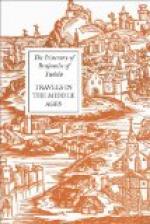[p.58]
Along the road the walls are adorned with silk and purple, and the inhabitants receive him with all kinds of song and exultation, and they dance before the great king who is styled the Caliph. They salute him with a loud voice and say, “Peace unto thee, our Lord the King and Light of Islam!” He kisses his robe, and stretching forth the hem thereof he salutes them. Then he proceeds to the court of the mosque, mounts a wooden pulpit and expounds to them their Law. Then the learned ones of Islam arise and pray for him and extol his greatness and his graciousness, to which they all respond. Afterwards he gives them his blessing, and they bring before him a camel which he slays, and this is their passover-sacrifice. He gives thereof unto the princes and they distribute it to all, so that they may taste of the sacrifice brought by their sacred king; and they all rejoice. Afterwards he leaves the mosque and returns alone to his palace by way of the river Hiddekel, and the grandees of Islam accompany him in ships on the river until he enters his palace. He does not return the way he came; and the road which he takes along the river-side is watched all the year through, so that no man shall tread in his footsteps. He does not leave the palace again for a whole year. He is a benevolent man.
[p.59]
He built, on the other side of the river, on the banks of an arm of the Euphrates which there borders the city, a hospital consisting of blocks of houses and hospices for the sick poor who come to be healed[126]. Here there are about sixty physicians’ stores which are provided from the Caliph’s house with drugs and whatever else may be required. Every sick man who comes is maintained at the Caliph’s expense and is medically treated. Here is a building which is called Dar-al-Maristan, where they keep charge of the demented people who have become insane in the towns through the great heat in the summer, and they chain each of them in iron chains until their reason becomes restored to them in the winter-time. Whilst they abide there, they are provided with food from the house of the Caliph, and when their reason is restored they are dismissed and each one of them goes to his house and his home. Money is given to those that have stayed in the hospices on their return to their homes. Every month the officers of the Caliph inquire and investigate whether they have regained their reason, in which case they are discharged. All this the Caliph does out of charity to those that come to the city of Bagdad, whether they be sick or insane. The Caliph is a righteous man, and all his actions are for good.




